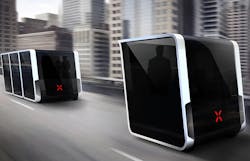Although I know we live in an age that is indifferent to propriety, when toppling idols and trashing customs represents the “new normal,” it’s a relief for me to see December arrive. Like some inverted Roman holiday, I can revel in the fact that things seem to have been turned back to a normal state – with predictable decorations, overplayed music, and improbable ads touting expensive purchases like diamonds and luxury cars with bows on top.
Another tradition that survives even now is the year-end forecast, a staple of business journalism since the Eisenhower age: it survives not only because it fills space during times when magazine ads can be scarce, but also because readers want to know what “experts” and “insiders” know about the future on subjects that matter to them.
But, while I was intrigued to see Automotive News introduce a series on the changing nature of the auto industry, I am still uneasy about the vision laid out by one of the contributors to the series, former General Motors vice chairman Robert Lutz. In his remarkably candid entry, the now 85-years-old Lutz — who also headed product development for GM and held top-level executive posts at Ford, Chrysler, BMW, and Opel — essentially described the demise of automotive manufacturing as we have known it.
The first and most salient point Lutz makes is that the end of the automotive era that paralleled the 20th Century is not simply because of the prospect of autonomous vehicles, though he acknowledges that emerging factor, but rather because travel in the age of autonomous vehicles will be done in highly standardized modules. He foresees an “end state” of fully autonomous modules that offer no option for a driver to “exercise command. You will call for it, it will arrive at your location, you’ll get in, input your destination and go to the freeway,” he writes in his essay – which has a tone that is equal parts bitterness and despair. It’s impossible to miss the irony of an invention that for more than a century has reified the individual autonomy which we regard as a birthright, now overtaking individuality with the promise of autonomy.
In 15 to 20 years, according to Lutz, human-driven vehicles will be outlawed, in the cause of safety and efficiency. Customer/drivers will be largely passive in this transition he predicts, because large fleets of new providers (Uber, Lyft, Google, Amazon) will gradually erode the base of car buyers, and the manufacturing of vehicles for these suppliers and large fleets (FedEx, UPS, etc.) will ease the transition for manufacturers.
Manufacturers may not last long in this new paradigm, however, as the leverage of the large fleets will force them into a position he compares to handset manufacturers. The value will not be in the device, but in the service. And this will mean the end of automotive styling and performance, which will knock out those OEMs and suppliers whose value is built on such factors.
Also headed for the remainder bin will be the automotive retailing, aftermarket, and service sectors: if there are no car owners, all these will become unnecessary and unsupportable.
Making predictions is not a game if there are lives or fortunes at stake. It’s easy to be charmed by technological wizardry, and even easier to be impressed by the foolish money that follows such gadgets. Some of the current ventures into autonomous vehicle technology appear promising, while others are starting to seem like con games.
What no one can accurately predict – though Bob Lutz tries with more credibility than most – is how human nature will respond to such developments. Will all the financial and regulatory tumblers turn exactly as Uber and Google and other developers intend? How will the broader economy function if the financial might of manufacturers, insurers, creditors and lenders is neutralized in this process?
As usual, I’m mostly interested in the response of human nature to this shift, first at the wider realization that we are all ciphers in the logistical vision of several large information technology providers, and ultimately in the reduced value of self-governance. What then? We need a different longer-term vision that will allow us to move forward with some of the dignity and assurance that, happily, is not entirely lost to memory.
About the Author
Robert Brooks
Content Director
Robert Brooks has been a business-to-business reporter, writer, editor, and columnist for more than 20 years, specializing in the primary metal and basic manufacturing industries. His work has covered a wide range of topics, including process technology, resource development, material selection, product design, workforce development, and industrial market strategies, among others.
